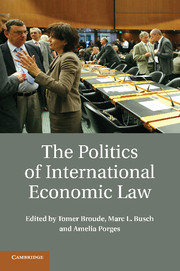Book contents
- Frontmatter
- Contents
- Contributor List
- Acknowledgments
- 1 Introduction
- Part I The Politics of Law Making in International Trade
- Part II The Politics of International Investment Treaty Making
- Part III The Politics of Sovereign Wealth and International Financial Law
- Part IV The Politics of Dispute Settlement in International Economic Law
- 11 Ruling Not to Rule
- 12 The Politics of Competing Jurisdictional Claims in WTO and RTA Disputes
- Part V Linkages between International Economic Law and Foreign Policy
- Index
12 - The Politics of Competing Jurisdictional Claims in WTO and RTA Disputes
The Role of Private International Law Analogies
Published online by Cambridge University Press: 03 May 2011
- Frontmatter
- Contents
- Contributor List
- Acknowledgments
- 1 Introduction
- Part I The Politics of Law Making in International Trade
- Part II The Politics of International Investment Treaty Making
- Part III The Politics of Sovereign Wealth and International Financial Law
- Part IV The Politics of Dispute Settlement in International Economic Law
- 11 Ruling Not to Rule
- 12 The Politics of Competing Jurisdictional Claims in WTO and RTA Disputes
- Part V Linkages between International Economic Law and Foreign Policy
- Index
Summary
INTRODUCTION
What is the relationship between the World Trade Organization (WTO) dispute settlement mechanism and the dispute settlement mechanism under a regional trade agreement (RTA)? Even before the WTO was established, the North American Free Trade Agreement (NAFTA) had included a provision dealing explicitly with the relationship between its dispute settlement system and the one under the General Agreement on Tariffs and Trade (GATT), and any successor agreements. The problem is therefore not new, but only in recent years has it become more pronounced.
In the first years of the establishment of the dispute settlement mechanism (DSM), it was touted as an example of how an international dispute settlement system should be. It has compulsory jurisdiction; all WTO members had to accept the DSM as part of a single undertaking when they joined the organization. Moreover, with the newly introduced “negative consensus” rule, any WTO member can bring suit against another WTO member without risk of blockage, either at the point of panel establishment or subsequently in the adoption of panel reports. The WTO has an appeal system, in the form of the Appellate Body, whose reports are also saved from blockage by the Dispute Settlement Body (DSB), the supervisory political body comprising all the WTO members, because of the negative consensus rule. It was not long after the establishment of the DSM that a problem that public international lawyers have been increasingly concerned with – the proliferation and fragmentation of international tribunals – started to have an impact on the DSM and its operation.
- Type
- Chapter
- Information
- The Politics of International Economic Law , pp. 282 - 314Publisher: Cambridge University PressPrint publication year: 2011
- 2
- Cited by

